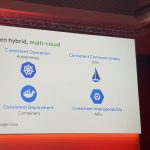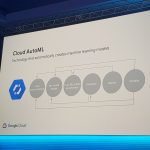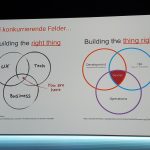
In the beginning of last week, I visited the Google Cloud Summit in the International Congress Center in Munich. Initially, I tried not to compare the event with the Fujitsu Forum in two weeks earlier. However, I could not resist the temptation, because some topics were similar. The main focus was obviously on Google’s Cloud Platform and its recent updates. Other topics related to the cloud platform were collaboration within companies, artificial intelligence as service and realizing the culture and mindset change within companies. Although I saw some very good speakers, I was a bit disappointed with the average quality of the speakers. I definitely expected more from a company like Google.
Partner Eco-Systems and Co-Creation
As mentioned above, there were several similarities to the topics at the Fujitsu Forum. The keynote outlined the importance of partner eco-systems. Google also believes that no company can deliver everything anymore today. Instead an eco-system of partners or platforms is crucial for every company moving forward. Especially as most industries are powered by technology nowadays. It became obvious that most industries are moving away from an economy of scale towards an economy of speed. In the past it was more important to produce on a larger scale to achieve better prices (e.g. Ford in the early 20th century). Today it is more important to establish the platform before somebody else does. Once a platform is established and accepted by its users, it becomes impossible for competitors to establish another similar platform in the same market segment (e.g. PayPal).
Google Cloud Platform – What’s new?
Even though various cloud offerings have democratized the business world, many well-established companies still prefer to keep part of their IT on premise. Google has reacted to this with a much stronger focus on hybrid cloud approaches. Google calls it open hybrid, multi cloud with containers for consistent deployment and Kubernetes for consistent operation at the core. In fact, it was announced, that Google Kubernetes Engine (GKE) is also available on premise now. From the beginning on, Google based the cloud platform mostly on open source solutions. Google stressed heavily, that it uses containers much longer than any competitor. Combined with collaboration tools and AI services the Google Cloud Platform offers and interesting package. However, my personal feeling is, that in terms of maturity Microsoft and Amazon are still ahead.
Artificial Intelligence as a Service
Google not only wants to democratize the business world, but also the usage of artificial intelligence. When implementing machine learning most time is spent on analyzing, cleaning and understanding the data. With Cloud AutoML, Google offers its users machine learning functionality without having to do the data scientist work. Basically, Cloud AutoML is a technology that automatically creates machine learning models. In the Cloud AI portfolio several building blocks or complete solutions are already available. This could make artificial intelligence easier accessible for many customers. One example I saw in a live demo were industry specific translations in near real-time. This translation service was pre-trained with industry specific terminology and offered as a service. I believe, that such systems can become personal translators in real-time one day.
Reimagine Collaboration
Collaboration was a huge topic at the cloud summit – pushed not only by Google itself, but by many partners, too. It is known, that the current e-mail-based collaboration is not very efficient. Too much time is spent on reading and responding to e-mails. Google wants to reimagine collaboration with the GSuite (e.g. Docs, Gmail, Hangouts). The GSuite is available for company usage now. I am curious to see whether larger companies will move away from the well-known Microsoft suite. I am not so sure this will be the case. For secure remote usage Google came up with a hardware key – a hardware key? From an innovative company I expected more than handing out hardware keys to everybody. For companies with distributed teams, hardware keys make maintenance much more complex.
Culture & Mindset change
Independent of the hardware key there is still a way to go to change the mindset within companies. This will be crucial in order to work more efficiently. The best tool will not help, if the companies remain with the same old processes and people work in the same way they used to. To progress, changing the work culture is as important as processes and technology. However, there is a lot of resistance, which is mostly caused by fear. It can be fear of losing control, competence, appreciation or relationships. Realizing and addressing these fears is crucial when changing a company’s culture.
Steps to a new Company Culture
In his speech, Nils Heuer talked about ingredients for successful projects at Google, which are:
- Reliability of colleagues
- Work serves a purpose
- Mental and creative security
- Employees appreciate their contribution
- Established structure and transparency
I believe that especially point 2. and 4. are important. The new work culture has to address the rational (head), emotional (heart) and behavioral (legs) level. Most importantly it has to be reflected by everybody in the company. If managers do not reflect the new culture, employees will not follow. This cultural democratization at work is still far away in many established companies.







